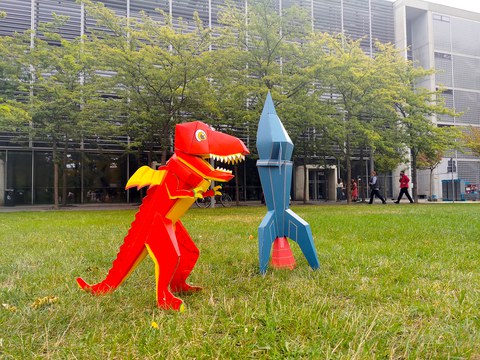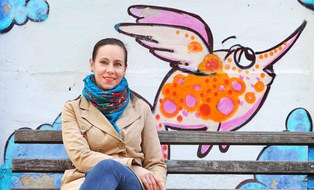Aug 31, 2020
Learning Without Grades – The University School Dresden Opens its Doors to 360 Pupils at the Start of the School Year

A scene outside the Auditorium Center (HSZ) at the festive induction. German children traditionally receive a “Zuckertüte” – a paper or cardboard cone full of treats – from their parents upon starting school. Some designs were particularly creative!
The University School Dresden, a joint pilot project headed off by TU Dresden and the City of Dresden, started off the new school year with 360 children in years 1 through 6. On August 29, sixty-three new first-graders celebrated starting school in a ceremony held at TU Dresden’s largest lecture hall. 80 additional pupils have been incorporated into the fifth grade since Monday.
No grades until year 9
The Saxon State Ministry for Higher Education, Research and the Arts (SMK) has issued an exceptional regulation enabling pupils of the University School Dresden to attend school without receiving numeric grades until year 9. In July, the first report cards were issued as learning progress reports without grades. These reports are primarily addressed to the students directly. School principal Maxi Heß explains, “We want to give the children feedback on what they have already learned and the skills they have acquired. The clear description of skills written in simple language is much easier to understand than a number. What does it mean to receive a 2 in math? Can a number tell me what I am capable of?”
The learning objectives specified in the Saxon curriculum framework are transposed into individual learning pathways. The learning facilitators are then tasked with instructing the children in project learning so that the objectives can be achieved. “But this doesn’t mean that the children can just do whatever they want. They flesh out a skills development path with the learning facilitators which is always traversed together with the other pupils. Learning is guided, but in a way that allows the students to work independently and cooperatively across subjects and grades.”
“We actually don’t even need report cards at the University School,” adds Patricia Schwarz, principal of the secondary school. “Because each child’s learning progress is continually logged and measured in the school’s software. The students can view this themselves and even parents can see their child’s progress. And the pupils learn at their own pace, not according to a testing or exam schedule, but still with a specific goal in mind.”
The system employed is compatible with the requirements for educational facilities and other, conventional schools, should pupils transfer. If necessary, a numeric grade can be generated from the learning progress report. The report cards issued at the end of the school year include an official recommendation that the student progress to the next grade in the following school year, as stipulated by the SMK.
Individual learning paths are mapped digitally
Teachers, parents and pupils at the University School welcomed the abolition of numeric grades wholeheartedly: “Now, everyone can focus on the actual learning and can stop worrying about unpleasant surprises on their mid-year report cards. It’s very liberating!” It can take some time to adjust for those who were previously used to numeric report cards at other schools. The school offers parents at least one meeting per year to help them “translate” our grading system into terms they understand better, says Maxi Heß. She adds, “The children at the University School take on a lot of responsibility in their own skills development. This allows them to experience more independence and self-efficacy through their successes in a system that sets many objectives. And this is the right path for us. After all, what does a young adult need in the 21st century? Creativity, the ability to work well with others and a high degree of self-reflection!”
The Dresden University School is a joint project of the City of Dresden and the Technische Universität Dresden. It is a public and free community school run by the city, where innovative forms of teaching and learning are tested under scientific supervision. In addition, it is a training school for future teachers and, in the future, a further education school for teachers. The school trial is being scientifically supported by the ForUS research center at TU Dresden.
 © Amac Garbe
© Amac Garbe
Kommunikationsmanagerin
NameMs Maria Neuland Agüero M.A.
Medienanfragen Alternatives Schulpraktikum & Universitätsschule
Send encrypted email via the SecureMail portal (for TUD external users only).
Büro am Weberplatz:
Rotunde, 120B Zellescher Weg 21
01217 Dresden
Deutschland
Please contact me for an appointment.
Office hours:
The best way to reach me is in the morning.
